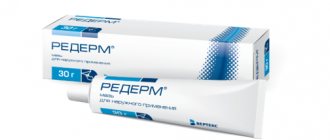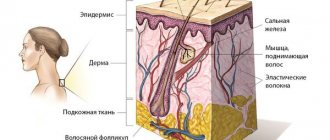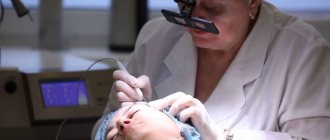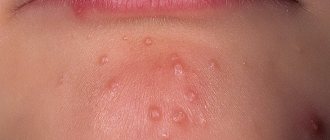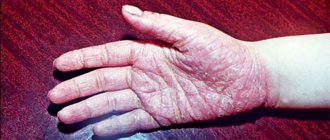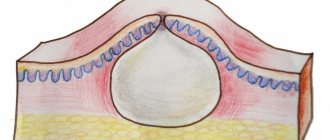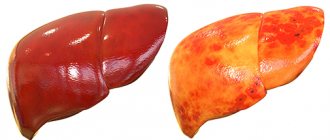Author: MC "Diamed-Tula"
Psoriasis is a disease caused by many factors. Reddish spots with silvery or white-gray scales appear on the skin. If you scrape them off, they will fall off. Such spots are called erythematous-squamous papules. They are localized in different places: on the folds of the upper and lower extremities, on the scalp, on the stomach and chest. Often the spots are located along the edge of the hair growth. This condition is called corona.
Symptoms of psoriasis
There are three characteristic symptoms for this disease. When making a diagnosis, the doctor pays attention to the following signs:
- Presence of stearin stain. If you rub a psoriasis spot, the peeling of its surface increases. Externally, the papule looks like stearine shavings.
- The appearance of psoriatic film. If the scales are completely removed, a thin and moist film appears on the skin.
- The occurrence of Auspitz syndrome. With prolonged trauma to the surface of the spot, bleeding occurs.
When making a diagnosis, the doctor additionally evaluates the condition of the nails. Psoriasis is characterized by thimble syndrome. These are inclusions in the form of dots on the nail plate. Under the influence of the disease, the nail turns yellow and thickens.
Psoriasis, localized in the armpits or under the mammary glands, often has a yellow tint to the patch. It may release liquid with an unpleasant odor.
Psoriasis does not spread immediately. The disease takes time to develop. First, single spots appear in the bends of the elbows and knees. Over time, the affected area grows. Plaques can merge with each other, forming formations in the shape of a garland. It spreads throughout the body. The longer a person is sick, the more difficult it is to get rid of psoriasis.
The medical doctor offers to make an appointment with a dermatologist. A full range of diagnostics and treatment of dermatological diseases in Tula. Tel. for recording.
Homemade compresses
Peeling scales are softened with compresses from available ingredients. A mixture of unrefined oils: olive, sunflower, almond, coconut and apricot moisturizes and reduces inflammation. Mix 2-3 components in a bowl and heat the mask in a water bath. Rub into the scalp with massage movements and wrap with a plastic cap. The oil medicine is left overnight, and in the morning the remains are washed off with an apple bite diluted with water. Glycothymoline and Listerine are used instead. For 60 ml of the selected drug, take 0.5 liters of warm liquid.
Nourishing cream for psoriasis is prepared from castor oil. Mix 15 ml of the component with liquid vitamins E, A and D. Add 10-15 drops of each additive to warm oil and gently rub the mixture into the inflamed formations. The head is wrapped in cling film and a terry towel to increase the absorption of nutritional components.
Symptoms of psoriasis are removed by clover flowers. Pour 6–7 tbsp into a thick gauze bag. l. dried plant. The workpiece is dipped in boiling water for 5 minutes and then lightly squeezed. A warm poultice is applied to the problem area until it cools. Tea from clover flowers is taken orally, but without honey or sugar.
Mustard masks increase blood circulation in the scalp. They reduce irritation and soothe itching. Medicinal paste is prepared from mustard powder. Warm water is added to the dry product in small portions until a thick mass is obtained, reminiscent of jelly in consistency.
The mask is distributed in a thin layer over the scalp. The treated areas are covered with cling film and a wool scarf or scarf is tied on top. Keep the mustard medicine until a strong burning sensation appears. The remaining powder is washed off with herbal decoctions that soothe reddened skin.
What factors provoke psoriasis?
The trigger is many reasons: autoimmune diseases, recurrent chronic diseases that affect decreased immunity. But no one can name the exact reasons.
Medicine identifies the following factors:
- hereditary predisposition. They assume it's a matter of genes. If the mother had the disease, there is a high probability of it occurring in the child;
- presence of chronic diseases. These include stomach and intestinal problems, as well as endocrine pathology;
- psychosomatics: experienced stressful situations and a nervous breakdown can trigger the appearance of psoriasis.
How to treat psoriasis: methods and drugs
To cure psoriasis, it is better to take a comprehensive approach. It is necessary to send the patient for consultation to other specialists: therapist, endocrinologist, gastroenterologist. They will help determine the cause of the malfunction in the body.
Therapy against psoriasis involves:
- use of antiallergic and antihistamine drugs. To eliminate external symptoms, a keratolytic ointment is prescribed, as well as an anti-allergy ointment. To achieve a good result, the patient must take zinc and B vitamins;
- if psoriasis is localized on the scalp, you can use medications in the form of shampoo. For example, Skin-cap shampoo. It contains pure zinc. For some patients, this drug is a salvation. It eliminates external manifestations without the use of hormonal agents. But there are also those for whom such treatment is not suitable;
- Ultraviolet rays are used to combat psoriasis. Treatment is carried out using a PUVA unit. It contains special lamps that emit ultraviolet light.
Therapy is selected individually for each patient. The doctor must be careful in prescribing, since incorrectly selected drugs will only aggravate the course of the disease. Self-medication will not have any effect. It's better to consult a specialist.
Many sayings and proverbs from different peoples of the world are devoted to health, including prevention, as an important component of maintaining health, because it is easier to prevent a disease than to treat it.
Chinese proverb: “A smart person avoids illnesses rather than being cured of them.”
Latin proverb: “A healthy mind in a healthy body”
Japanese proverb: “Taking care of your health is the best medicine.”
We would like to pay attention to methods for preventing exacerbations of psoriasis, which allow patients to significantly reduce the number of exacerbations and lengthen periods of remission. Compliance with simple rules, recommendations, and awareness is the key to successful treatment, which means supporting your health and helping you. People suffering from psoriasis can live full and active lives. With regular treatment, psoriasis can remain under control. The need to use a set of preventive measures during the period of remission is beyond doubt among specialists. Among the triggers for psoriasis, in their opinion, emotional stress is primarily important. However, the presence of infectious diseases, inflammatory diseases of the gastrointestinal tract, foci of chronic infection, such as tonsillitis, sinusitis, genitourinary diseases, can also trigger the appearance of the first signs of psoriasis. Quite often, psoriasis occurs in places of mechanical damage to the skin, namely in the area of cuts, scratches, injections, scratching, abrasions, burns, or after taking certain medications. The influence of climatic factors cannot be ignored. Almost all patients with psoriasis note the beneficial effect of the sun on the course of psoriasis. American writer John Updike described the course of psoriasis in the protagonist of the novel “Centaur”: “The summer sun melted the scabs; by September my chest and legs were clean, except for barely visible grains, pale, almost imperceptible, which, under the cold, harsh breath of autumn and winter, sprouted again. By spring they were in full bloom, but the warming sun already promised deliverance. But in January there was nothing to hope for.”
A natural question arises: what is the prevention of exacerbations of psoriasis?
- Although sun exposure does improve, sunburn is not recommended.
- We strongly recommend avoiding scratches, abrasions, cuts, etc.
- it is necessary to examine for the presence of concomitant diseases, foci of chronic infections - and appropriate treatment
- washing with a hard washcloth leads to skin trauma and aggravation of the disease; In no case should you mechanically remove scales when washing; baths with sea salt and herbal infusions (chamomile, sage) are beneficial
- Alcohol abuse sharply aggravates the course of the disease, making it untreatable
- treatment and physiotherapeutic procedures should be carried out only under the supervision of a doctor
Skin care First of all, it is useful to remember the washing and care regimen for the skin of a patient with psoriasis. When taking a shower or bath, use a soft sponge or cotton cloth. Avoid using a washcloth. Do not use harsh soaps, gasoline or other solvents to cleanse your skin, as this may cause new breakouts to appear. After a shower and or bath, it is important to apply an emollient, moisturizer (cream or body lotion, topical cream) to the skin to keep the skin smooth. Dry, cracked skin reduces the effectiveness of treatment. Keep your nails short. This will help you avoid damaging your skin. Also try to protect your skin from cuts and injuries, as these can cause new psoriasis breakouts to appear.
The skin of patients suffering from psoriasis requires special care. It is advisable to use specialized products for the care of diseased skin, so-called medical cosmetics, which can be purchased at the pharmacy. These products allow you to restore the hydrolipid mantle of the skin, thereby preventing its dehydration. Emollients should be used as often as the skin requires (at least once a day).
Sometimes clothing puts pressure on the skin, which can cause new breakouts, so choose light, loose, cotton clothing.
It is advisable to choose dresses or suits made from fabrics of light colors or with a pattern, as this will help camouflage scales that get on the clothes. Air conditioning can cause dry skin and the condition of the skin may worsen. If possible, limit time spent in air-conditioned rooms. In winter, humidify the indoor air both at work and at home.
Useful tips for patients with psoriasis Try to lead a healthy lifestyle, maintain a rational sleep and wakefulness regime. Try to avoid hypothermia and colds, as this leads to a decrease in the body's defenses (immunity) and provokes the appearance of rashes. In the mechanism of development of psoriasis, an important role is played by disorders of the nervous system. This concept includes the correct organization of the appropriate regime, work, rest, daily routine, maximum stay in the fresh air at any time of the year, and playing various sports.
Try not to overexert yourself and keep stressful situations to a minimum. The importance of mental trauma as a factor in the occurrence of psoriasis has been proven. To prevent exacerbation of psoriasis, proper organization of work for patients is important. They do not want to work with high temperatures and humidity, or exposure to harmful chemicals. Proper professional guidance for patients with psoriasis is also of great importance. They should not be recommended professions that are associated with constant trauma to the skin, exposure to allergenic factors, and neuropsychic overload.
In the past, many diseases were mistakenly attributed to poor diet. There is no scientific evidence of the effect of diet on the development of psoriasis. Many diets have been developed to improve psoriasis, but none of them have stood the test of time or received scientific confirmation. We can definitely and definitely say that eating foods containing fats, vinegar and pepper can provoke an exacerbation or worsen the course of the disease. It is recommended to avoid eating fatty foods, smoked meats, spicy dishes containing pepper, vinegar, marinades, etc. It has been noted that alcohol can provoke an exacerbation of psoriasis. In his dissertation, K. Tsabareishvili noted that alcohol consumption aggravates the course of psoriasis, contributes to the generalization of uncomplicated psoriasis and its transition to psoriatic erythroderma.
The role of smoking in the etiology and pathogenesis of psoriasis Studies have shown not only a significant connection between psoriasis and smoking at the time of the study, but also smoking before the onset of the disease. In addition, a connection was established between the number of cigarettes smoked per day and the risk of psoriasis - the greatest risk was for individuals who smoke 20 cigarettes or more per day. The main pathological processes through which tobacco smoke can affect the genesis of psoriasis are likely to be disturbances in the immune system, disturbances of microcirculation in the skin, as well as a weakening of the body's antioxidant defenses, which are observed in people who smoke.
Diet of patients with psoriasis
It is known that the onset of relapse often depends on the general condition of the patient during the period of remission and is largely determined by the regimen and nature of his diet. Chinese wisdom says: “Look for your illness at the bottom of your plate.” Patients with psoriasis, both during an exacerbation of the disease and during remission, should adhere to the following recommendations on the diet and nature of their diet:
1. It is prohibited to consume spicy, salty and smoked foods, which disrupt the absorption process in the gastrointestinal tract and can lead to an exacerbation of the disease. It is also not allowed to eat citrus fruits (oranges, tangerines, lemons, grapefruits), which contain the chemical colchicine, which destroys folic acid, which is necessary to restore the integrity of the skin. Eating corn and various products made from it is prohibited. Also excluded are those foods that cause exacerbations of diseases (strawberries, strawberries, mangoes, bananas, crabs, etc.). The consumption of alcoholic beverages is unacceptable.
2. Limit the consumption of canned food products, which are known to contain various preservative substances and may be one of the causes of exacerbation of the disease. You should limit the consumption of pickled, fried and fatty foods, coffee, chocolate, sweets, and flour products. Excessive consumption of potatoes, which contain a significant amount of potassium, is undesirable. Together with sodium salts contained in salty foods, potassium in the body acts as a calcium antagonist, which has anti-inflammatory properties. It is advisable to limit the consumption of perishable and semi-finished products (pate, meat and fish salads, etc.). It is necessary to limit the consumption of pork and lamb, which contain difficult-to-digest fats (stearic, palmitic, oleic and other fatty acids). Issues related to the limitation of certain products, taking into account their tolerance, must be resolved individually.
3. It is recommended to consume dairy-vegetable foods with the addition of the required amount of complete proteins and fats. Patients should be drawn to the need to consume sufficiently large amounts of protein foods. Daily consumption of cottage cheese and other dairy products (kefir, fermented baked milk, acidophilus, yogurt, etc.) is especially beneficial. As you know, these products contain the most complete set of essential amino acids, the presence of which is necessary to ensure biochemical reactions in the body. In addition, dairy products such as cottage cheese, processed cheese, and other types of cheese are an important source of calcium, which reduces inflammatory and allergic reactivity.
4. It is recommended to eat more plant foods, significantly expanding the range and proportion of raw vegetables and fruits in the overall diet. Cabbage is especially useful, as it is known to contain a large amount of mineral salts, trace elements and vitamins. Methylmethionine, which has a pronounced antiulcer effect, was also found in cabbage juice. Cabbage should be recommended to patients with psoriasis, especially those who simultaneously suffer from gastric ulcers and gastritis with reduced secretion of gastric juice.
It is recommended to eat carrots, which contain large amounts of calcium, iron, phosphorus and iodine salts. It also contains a lot of vitamins B1, PP, B9 and carotene - provitamin A. This vitamin promotes growth and development, ensures the processes of keratogenesis in the epidermis. It has the property of supporting the functions of epidermal keratinocytes due to the normalization of plastic metabolic processes in the skin and mucous membranes. Retinol increases the absorption of proteins, fats and carbohydrates, intensifying redox processes and cholesterol synthesis. Red beets are healthy, they are rich in calcium, magnesium, phosphorus, cobalt salts, vitamins C, B1, B2 and PP. The hypotensive properties of red beets have been noted, and therefore it should be recommended to patients with psoriasis who simultaneously suffer from hypertension. A salad that contains iron and iodine salts, carotene, vitamin C, E, B1, etc. is useful. Eating salad allows dermatological patients to improve metabolism and activate intestinal activity.
Patients with psoriasis should pay attention to the need to eat greens (dill, parsley, celery, lettuce, green onions, etc.). All of them are rich in beneficial mineral salts, vitamins and microelements. Dill, in particular, has an antispasmodic and tonic effect on the intestines. It is used to improve digestion and also as a diuretic. Dill, like red beets, contains a large amount of the microelement cobalt, which is part of the vitamin B12 molecule and is necessary for the functioning of the central nervous system and hematopoietic organs. Dill should be recommended to patients with psoriasis with symptoms of asthenia of the nervous system, reduced hemoglobin and diuresis, as well as in cases of sluggish (spastic) bowel function. It is also useful for dermatological patients suffering from hypertension, angina pectoris, cholecystitis, gastric and duodenal ulcers.
Patients with psoriasis should be recommended a wide range of fruit and berry crops. In addition to apples, pears, cherries, plums, apricots, you should also use other fruit and berry varieties. Of these, the most useful are rose hips, sea buckthorn, chokeberry, black currant, raspberries, blueberries and blueberries. Nuts and melons (watermelons, melons, pumpkins, zucchini, etc.) are useful. You can include gooseberries, rowan, viburnum, cloudberries, cranberries, lingonberries, dogwood, sloe, etc. in the diet of patients.
5. In addition to vegetables, you should eat various cereals. The most useful of them are: buckwheat, oatmeal and wheat.
6. There are some foods that have very beneficial nutritional properties (mushrooms, honey, eggs, crabs, tomatoes, sorrel, fish, cod liver, etc.). However, their use should be recommended only taking into account good individual tolerance.
7. Patients with psoriasis should drink enough liquid (milk, juices and compotes). Drinking mineral waters such as Essentuki, Narzan, etc. is also beneficial.
8. The feasibility of using vitamins in a complex of means for preventing relapses of psoriasis follows, on the one hand, from the known facts about the provoking effect of metabolic disorders, on the other hand, from the beneficial effect of vitamins on the body by increasing the body’s defenses, i.e. increasing the body’s resistance, etc. Impaired keratinization in psoriasis served as the basis for the use of vitamin A or retinol. Vitamin D is also used, which, by regulating the exchange of phosphorus and calcium, promotes the compaction of cell membranes, has a positive effect on regenerative processes in the epidermis, promoting the deposition of dehydrocholesterol in the skin. Particular attention is paid to the development of individual indications for the use of a particular vitamin or their complexes, components (undevit, revit, panhexavit, dekamevit, etc.), dosage and duration of use, course treatment methods in the period between exacerbations of psoriasis.
- avoid eating fatty foods, smoked meats, spicy dishes containing pepper, vinegar, marinades
- limit consumption of canned foods
- limiting flour and sweets
- eat a variety of grains. The most useful of them are: buckwheat, oatmeal and wheat
- Avoid smoking and drinking alcohol (especially beer, champagne, wine). Alcohol can cause psoriasis to worsen
- eat more plant-based foods (a variety of fresh vegetables and fruits)
- It is advisable to use multivitamin complexes
- sufficient amount of liquid, including mineral waters
- take into account individual food tolerance
Climatotherapy
As already noted, climatic and resort factors have not only therapeutic, but also preventive significance for psoriasis. A Latin proverb says: “Whoever medicine cannot cure, nature cures.” Sun exposure and sea bathing have beneficial effects. The main climatic factor is solar ultraviolet radiation. Sunbathing begins with 5-15 minutes with a gradual increase in solar exposure; the use of sunscreen is mandatory. Depending on the condition of the skin process, the time spent in the sun and sea water is corrected. It should be remembered that improvement is observed only after a few weeks. Sunburn, which aggravates psoriasis, should be avoided. If there are wounds or scratches on the body, swimming in the sea is prohibited. For patients with high disease activity, travel to the sea is generally contraindicated until the process stabilizes, which requires preliminary preparation. Sunbathing increases the risk of skin cancer, so it is recommended to have your skin checked by a doctor annually.
Consult your doctor about the optimal sunbathing regimen and the best month for climatotherapy in different countries. In general, sunlight has a beneficial effect on psoriasis. Patients living in cold climates usually notice a significant improvement in their condition after sunbathing or spending time in the south. A small percentage of patients experience worsening after sunbathing. Avoid taking baths with Dead Sea salts yourself. Salts can cause an increase in the number of rashes, especially during an exacerbation of psoriasis.
What you need to know about psoriasis
- the disease has a seasonal course;
- There are several types: teardrop-shaped, herpes-shaped and warty. With the latter type, growths in the form of warts appear on the scales;
- this disease is not contagious: using the same towel with a carrier of psoriasis is not critical;
- can be inherited from relatives. To predict the development of the disease, pay attention to the skin condition of your loved ones;
- the development of psoriatic arthritis is possible. It affects the joints;
- the disease is well treated at the Dead Sea. Patients specifically buy trips to Israel to get rid of their illness.
Prevention: how to reduce the risk of relapse
Unfortunately, medicine currently does not know how to completely cure psoriasis. Therapy removes external manifestations and discomfort. But the risk of relapse is high. The situation is similar to oncology. Hereditary predisposition influences. But some people develop psoriasis, and some don’t. To reduce the frequency of manifestations, try to lead a healthy lifestyle: eat well, get enough sleep, and take care of your health. It would not be a bad idea to visit a dentist, endocrinologist, gastroenterologist or ENT specialist if there are problems with them. Carious cavities, inflammation of the tonsils and a large stomach can become provoking factors for a relapse. The longer the period spent in remission, the more effectively the body recovers and the lower the load on the immune system.
How does the skin change with psoriatic lesions?
Normally, epidermal cell renewal takes 3-4 weeks. With psoriasis, this period is reduced to 4-7 days. As a result, degradation occurs and the skin loses its protective properties. She becomes vulnerable to minor injuries and prone to inflammation. The scaly plaques that form can be painful and itchy.
General principles of skin care for psoriasis are aimed at:
- minimizing microtraumas;
- reduction of irritation from chemical and mechanical influences;
- additional food;
- moisture preservation.
Problem areas do not need to be combed, because unnecessary trauma will only aggravate the inflammation. Friction of clothing should be avoided: choose wardrobe items made from natural soft fabrics, avoid tight fit.
Doctors do not recommend removing keratinized scales yourself. The best solution is to exfoliate them naturally as the skin's integrity is restored.

